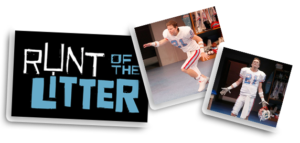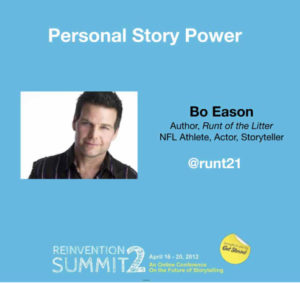NFL player … turned playwright … turned story evangelist? Really? Reinvention Summit 2 was my first introduction to Bo Eason, whose one-man play, Runt of the Litter, is a semiautobiographical account of Eason’s life and career as a safety for the Houston Oilers in the 1980s.
Eason’s session provided a glimpse of his teachings and beliefs about the  power of telling your personal story, and happily, we don’t have to be satisfied with a glimpse, thanks to the rich list of resources that an attendee shared; they appear at the bottom of this post.
power of telling your personal story, and happily, we don’t have to be satisfied with a glimpse, thanks to the rich list of resources that an attendee shared; they appear at the bottom of this post.
But here’s an overview:
Eason says he got to be the best by following his own story. He describes the pivotal moment that set him on his path to being the best and determined what his story would be. As a boy, he was denied his fondest dream of playing Little League with his brother. Indeed, for a brief moment, he felt life was over if he couldn’t play with his brother. But the next moment, he made up his mind, “That’s never happening again. I have a better story.”
Something happens where your heart is cut out, and you decide it’s never happening again, Eason says.
“Most of us don’t think our stories are dramatic,” Eason says. On the contrary “to live in this world is dramatic beyond belief,” he insists. It is, in fact, “out of bounds to say you don’t have a good story.” Eason believes we should be able to say of our stories: “I love my story more than your love your story. I’m more generous with my story than you are with your story.”
As storytellers, Eason asserts, we need to train ourselves to have courage and resolve. Resolute courage, in fact. Of our listeners, we must think: “Let them deal with MY humanity.”
We make a decision, he says, to fight, go to the mat for beliefs. We need to “fall in love with the pain.”
Host Michael Margolis illuminates: “We collect experiences to have stories to tell. The things we think people don’t want to hear are the source of our greatest power.” Eason adds: “Surrender is the golden goose, the key to the kingdom; all roads lead from your story, which is your wound.” We need to ask ourselves, “What is the thing I’ve always been trying to heal or fix?”
Eason wound up with three messages he wanted to convey about our stories. I’ve included my comments on these [in brackets]:
- The more personal you tell your story, the more universal it becomes, the more it connects with others. [Yes! I completely believe in this one.]
- You most physicalize or embody your story so it’s encased in you 24 hours a day. Here, Eason tells of an encounter with Mikhail Baryshnikov, whose mangled feet told the story of how much he puts into his art. “We believe the body 100 percent of the time,” Eason says. “The body can’t lie.” [I’m sure this is true for Eason and many people; Eason is an athlete, whose use of his body as his instrument has been important since childhood. I’m not sure it’s true of everyone.]
- Generosity = money. Your bottom line is directly proportional to how much you give in your arena. Whoever is the best in the field gives the most of themselves. The more you give, the more you get paid and the more influence you have. [Generosity is the most distinctive characteristic I’ve observed of story practitioners in the seven years I’ve reported on them. It just may be the secret sauce of storytelling.]
Eason closes by discussing the “lost art of giving all of yourself all of the time.” He says: “You are not your feelings; you are your commitments. Your commitments override any feelings or fear you have.” We must be committed to having an impact, making a difference, he says. Below are examples of how Eason is having an impact and making a difference.
Summit participant Kimberly Burnham shared her favorite Bo Eason resources:
- 7-minute clip of Bo Eason as part of a set of teaser videos for Reinvention Summit 2
- Awesome Bo Eason 40-minute video, “The Power of Personal Story,” about telling your story, right after he performs his one man show, Runt of the Litter
- Bo Eason at the Fulltime Messenger program (1 hour, 25 minutes)
- Bo Eason show clip (10 minutes)
- Zsuzsa Novak, Hungarian Freedom Fighter shares her story after the Bo Eason Event (Podcast)
- Amazing sharing from Marisa Murgatroyd at the Bo Eason Personal Power Event (about 15 minutes)
- MISFIT by JK at Bo Eason’s Power Story telling Event (about 10 minutes)

